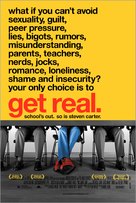Reviews provided by RottenTomatoes
Susan Stark, Detroit News: Read more
Stephen Holden, New York Times: It offers a far more realistic and compelling vision of teen-age growing pains and peer pressure than any of the recent high-school movies from Hollywood. Read more
Lisa Alspector, Chicago Reader: An issue movie, a comedy, and a love story, this is pretty good at being all three. Read more
Eleanor Ringel Gillespie, Atlanta Journal-Constitution: The movie bravely goes where too many other films have gone before. Read more
Kevin Thomas, Los Angeles Times: Shore and Wilde have done an admirable job in re-imagining Wilde's play as a movie, and they've created a wrenching, thoughtful entertainment that incorporates considerable comic relief. Read more
Rick Groen, Globe and Mail: Yes, we've heard the tale before, but somehow it just never gets stale: Welcome to another instalment of Romeo and Romeo. Read more
James Berardinelli, ReelViews: In Steven, John, and their friends, Shore gives us individuals worth caring about in situations we can all relate to, regardless of our sexual orientation. Read more
Roger Ebert, Chicago Sun-Times: The movie is sound in all the right ways; it argues that we are as we are, and the best thing to do is accept that. Read more
Bob Graham, San Francisco Chronicle: Get Real is a sweet-natured coming-out comedy from England that seems to be coming out about 10 years too late. Read more
David Edelstein, Slate: The strength of this agreeable comedy, directed by Simon Shore from a screenplay by Patrick Wilde, is that it makes even the tiniest sexual encounters seem emotionally momentous. Read more
Trevor Johnston, Time Out: The film is grounded in genuine emotions and its knowing humour serves it well. I laughed like a drain. Read more
Dennis Lim, Village Voice: Wilde's script, which has a weakness for mild, snickering double entendres, is notable for its near-total reliance on archetypes. Read more

